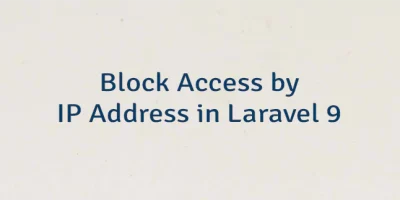One of the ways to debug Laravel application is logging all executed SQL queries. After that, we can analyze queries, find bugs and optimize the performance of a Laravel application.
This tutorial shows how to log all executed SQL queries to a file in Laravel application.
One of the easiest ways to log queries is to register the query listener by using DB::listen method. This can be done in the boot method of a AppServiceProvider class located at app/Providers directory. Listener is provided as callback which is invoked for each time when SQL query was executed.
app/Providers/AppServiceProvider.php
<?php
namespace App\Providers;
use Illuminate\Database\Events\QueryExecuted;
use Illuminate\Support\Facades\DB;
use Illuminate\Support\Facades\Log;
use Illuminate\Support\ServiceProvider;
class AppServiceProvider extends ServiceProvider
{
// ...
public function boot(): void
{
DB::listen(function(QueryExecuted $event) {
Log::info(
'SQL Query',
[
$event->sql,
$event->bindings,
$event->time,
]
);
});
}
}Log entries are written to a laravel.log file located at the storage/logs directory.
storage/logs/laravel.log
[2020-12-30 03:17:47] local.INFO: SQL Query ["select * from `projects` where `id` = ? limit 1",["4"],13.08]The log entry contains the SQL query, an array of query bindings and query execution time in milliseconds.
Another way to log queries is to create the query listener as a separate class and register it in a $listen array of a EventServiceProvider class. This way is recommended because code for query logging is stored in a separate file.
Execute the following command to generate listener class:
php artisan make:listener QueryExecutedListenerThis command creates the QueryExecutedListener class located at app\Listeners directory. The handle method contains code to log queries.
app\Listeners\QueryExecutedListener.php
<?php
namespace App\Listeners;
use Illuminate\Database\Events\QueryExecuted;
use Illuminate\Support\Facades\Log;
class QueryExecutedListener
{
public function handle(QueryExecuted $event): void
{
Log::info(
'SQL Query',
[
$event->sql,
$event->bindings,
$event->time,
]
);
}
}Query listener must be registered in the EventServiceProvider class. The handle method will be executed when the QueryExecuted event is triggered.
app/Providers/EventServiceProvider.php
<?php
namespace App\Providers;
use App\Listeners\QueryExecutedListener;
use Illuminate\Database\Events\QueryExecuted;
use Illuminate\Foundation\Support\Providers\EventServiceProvider as ServiceProvider;
class EventServiceProvider extends ServiceProvider
{
// ...
protected $listen = [
QueryExecuted::class => [
QueryExecutedListener::class,
],
];
}SQL queries can be logged in a separate file. Since Laravel 5.6 we create custom log channel which can be specified in config\logging.php file.
config/logging.php
<?php
// ...
return [
// ...
'channels' => [
// ...
'sql_query' => [
'driver' => 'single',
'path' => storage_path('logs/query.log'),
'level' => env('LOG_LEVEL', 'debug'),
],
],
];We created sql_query log channel. Entries will be written to a query.log file located at the storage/logs directory.
We can use the Log::channel method to specify which channel should be used for logging.
app\Listeners\QueryExecutedListener.php
<?php
namespace App\Listeners;
use Illuminate\Database\Events\QueryExecuted;
use Illuminate\Support\Facades\Log;
class QueryExecutedListener
{
public function handle(QueryExecuted $event): void
{
Log::channel('sql_query')->info(
'SQL Query',
[
$event->sql,
$event->bindings,
$event->time,
]
);
}
}



Leave a Comment
Cancel reply